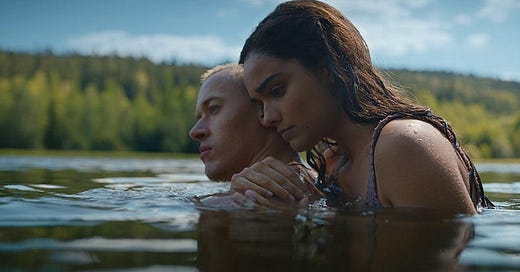Film Review — The Hunger Games: The Ballad of Songbirds & Snakes
Rachel Zegler and Tom Blyth attempt to breathe life into a disappointing prequel to Suzanne Collins’s dystopian trilogy
First, I must confess I’ve not read the novel upon which this prequel to The Hunger Games trilogy is based. After thoroughly enjoying the previous novels by Suzanne Collins before seeing the films, I came to this one without any prior knowledge. Admittedly, this limits my perspective, but based on the film alone, The Hunger Games: The Ballad of Songbirds & Snakes is a disappointment. It isn’t as bad as some reviews have made out, but it offers very little in the way of additional insight into Collins’s dystopian world, nor does it have anything like the same narrative urgency as its predecessors.
Acknowledging the inspirational touchstones that informed The Hunger Games has resulted in defensiveness in certain fandom quarters, but I think it is disingenuous not to point to the likes of Battle Royale (2000) or even further back to Rollerball (1975), whilst also noting the books are strong and singular in their own right. The previous set of films are pretty good too; or at least, the first two are (the third novel was split in two, I suspect for cash-grab reasons, rather emasculating the dramatic impact on film). As for this one, did we really need a detailed backstory for Coriolanus Snow, the villain in the original trilogy?
I suppose we didn’t need Star Wars prequels either, but here we are, in a version of the child deathmatch dystopia set several decades before the original story. The titular games are much cruder in this earlier period. For example, the unfortunate annual “tributes” from the twelve districts that rebelled against the Panem capital are rounded up in railway freight cars that evoke images of Jews arriving at Auschwitz (unlike the luxurious transportation that would later replace this ugly way to make the journey). In the capital, they are unceremoniously plonked in a zoo (again, a far cry from the pampering and training they receive in later years), and shortly afterwards, are forced to fight and kill one another in a televised gladiatorial contest.
The trouble is that television ratings are down. The Hunger Games may not continue much longer; something their co-creator Dean Casca Highbottom (Peter Dinklage) doesn’t necessarily think is a bad thing. On the other hand, games designer Dr Volumnia Gaul (Viola Davis) is less than happy with the waning interest. However, she is pleased when young Academy student Coriolanus Snow (Tom Blyth) takes his new job of mentoring country and western singing district twelve tribute Lucy Gray Baird (Rachel Zegler) seriously. Unfortunately, he takes it so seriously that he falls in love with her, risking his career to find ways for her to triumph in the games.
Performances aren’t bad, especially from Zegler, even though her character doesn’t seem entirely plausible (unlike Katniss in the originals). Director Francis Lawrence and screenwriters Michael Lesslie and Michael Arndt play to Zegler’s strengths by having her sing in the film. Yet despite this, many aspects of her relationship with Blyth’s Snow fail to convince. Much of the CGI is similarly unconvincing (a vat of colourful snakes looks particularly cartoony) and the film is far too long. What once felt compelling now feels routine, lacking the unpredictable edge of the earlier stories.
Despite succumbing to prequelitis, The Ballad of Songbirds & Snakes isn’t a total loss. There’s a meagre quota of entertainment value to be had in Jason Schwartzman’s Hunger Games television host, for instance; a welcome relief from the one-note, po-faced solemnity of the rest of the film. Still, watching this, one can’t help but feel as though the final drops of blood are being wrung from a stone. What’s more, I’m no fashion expert, but Snow and his fellow students look ridiculous in those red skirts. Later, Snow winds up resembling Draco Malfoy; never a good look for someone with whom we’re expected to sympathise, at least until they cross the line into villainy. But it takes an often dull 157 minutes for Snow to get there, by which time I suspect audience patience is exhausted. Mine certainly was.
(Originally published on Medium.)
The Dillon Empire beyond Substack
For a full list of my published novels, click click here.
For more on my novels and other projects, click here for my blog.
For my Patreon page, click here.
For my Medium page, click here.






Blyth may have gotten the job because he closely resembles Donald Sutherland, who played Snow in the earlier films.